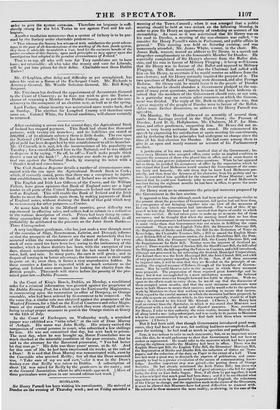After sustaining a severe run for several days the Agricultural
Bank of Ireland has stopped payment. This Bank had about five thousand
partners, with twenty-six branches; and its liabilities are stated at 800,000/. ; of its ultimate solvency there is little doubt. The run upon the National (O'Connell's) Bank has been trifling. A sufficient sup- ply of gold has been despatched by this establishment to all its branches. Mr. O'Connell, it is said, felt the inconvenience of his popularity on Tuesday ; fora crowd followed him to the National, and he was obliged to disperse it by saying, "Be off, be off!—You'll make people think there's a run on the bank !" An attempt was made to get up a poli. fical run against the National Bank, by stamping its notes with a "Death's head and cross-bones."
The Cork Southern Reporter details a number of circumstances con- nected with the run upon the Agricultural Branch Bank in Cork ; which, if correctly stated, prove that there was a conspiracy to bloke that establishment, in which the Bank of Ireland was an active agent.
The English and Irish Law Officers of the Crown, and Sir William Follett, have given opinions that Bank of England notes are a legal tender in all parts of the United Kingdom—in Ireland and Scotland as well as England. This will enable the Bank of Ireland and the Irish Banks to meet the demands upon them, by making payments of Bank of England notes, without draining the Bank of that gold which may be so necessary for other purposes.—Courier.
At some fairs held in the Midland counties, great difficulty was experienced in effecting sales, and sellers had to submit to a reduction in the various description of stock. Prices had been rising to some- thing approaching the war rates; and this sudden fall should, in all probability be attributed to the pressure on the Joint Stock Banks.— Times Correspondent.
A very intelligent gentleman, who has just made a tour through most of the counties of Sligo, Roscommon, Leitrim, and Donegal, informs us that the prospects of the farmers are the most melancholy that has occurred within the remembrance of the oldest of them. For every stack of corn saved ten have been lost, owing to the inclemency of the weather, which in those districts has been, with the exception of two days, almost uninterruptedly broken for the last month by alternate snow, hail, and rain. In many parts, the corn is still green ; and in despair of turning it to better advantage, the farmers sent in their cattle to graze on it; even then, it forms a very unproductive fodder. In these counties a famine is expected with as much certainty as the spring, and Ireland once more must be looking for charity from the British people. Thousands will starve before the passing of the pro- mised poor-law.—Dublin Freeman.


























 Previous page
Previous page